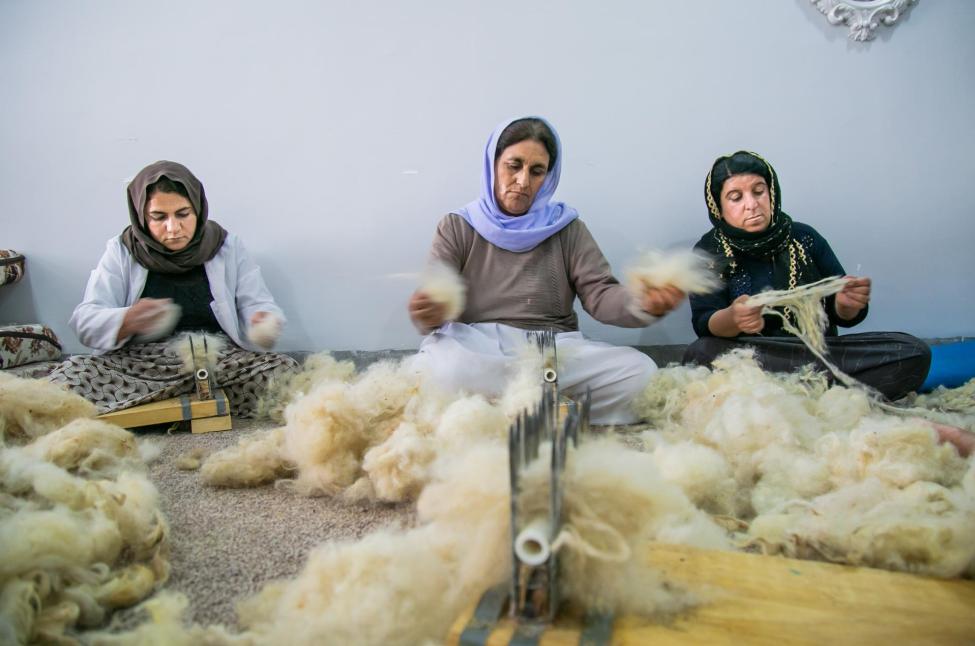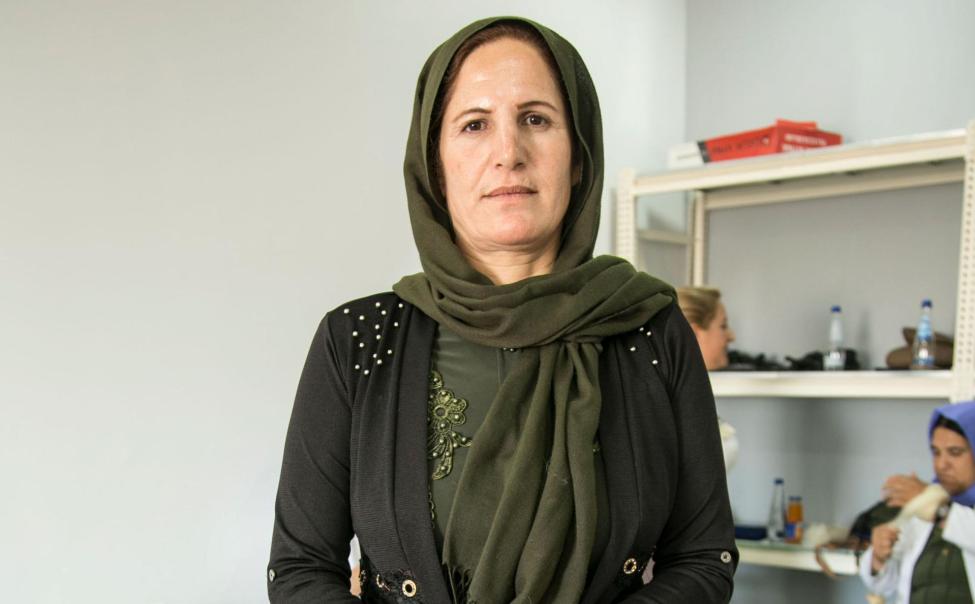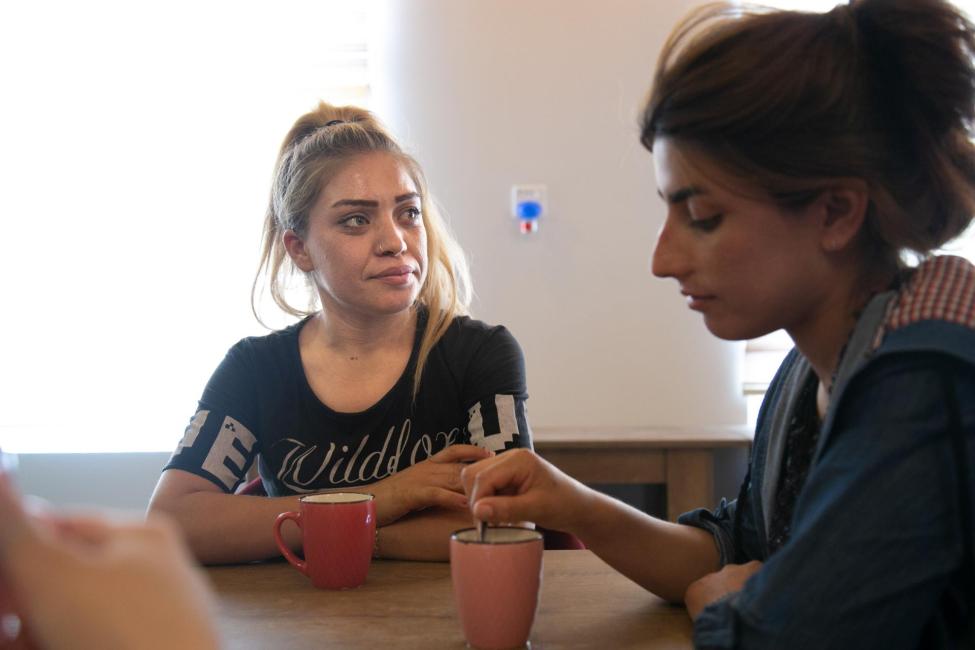-
من نحن
من نحنتعد المنظمة الدولية للهجرة جزءًا من منظومة الأمم المتحدة باعتبارها المنظمة الحكومية الدولية الرائدة التي تروج منذ عام 1951 للهجرة الإنسانية والمنظمة لصالح الجميع ، حيث تضم 175 دولة عضو وتتواجد في أكثر من 100 دولة. ان المنظمة الدولية للهجرة لها وجود في العراق منذ عام 2003.
معلومات عن
معلومات عن
المنظمة الدولية للهجرة في العالم
المنظمة الدولية للهجرة في العالم
-
عملنا
عملنابصفتها المنظمة الحكومية الدولية الرائدة التي تروج للهجرة الإنسانية والمنظمة منذ عام 1951 ، تلعب المنظمة الدولية للهجرة دورًا رئيسيًا في دعم تحقيق خطة عام 2030 من خلال مجالات التدخل المختلفة التي تربط بين المساعدة الإنسانية والتنمية المستدامة. في جميع أنحاء العراق ، تقدم المنظمة الدولية للهجرة استجابة شاملة للاحتياجات الإنسانية للمهاجرين والنازحين داخليًا والعائدين والمجتمعات المضيفة.
ماذا نفعل
ماذا نفعل
القضايا العالمية الشاملة
القضايا العالمية الشاملة
- البيانات والمصادر
- بادِر
- 2030 Agenda
Khazal, Ibtisam and Flous were total strangers before ISIL attacked their villages near the Yazidi town of Sinjar in 2014. Four years later, these internally displaced persons live in Khanke, in the Kurdistan Region of Iraq, where they work together in Khanke’s Carpet Factory. They have formed strong bonds of friendship, sharing their joys and sorrow while weaving carpets for a brighter future.
“We take comfort in each other’s company here. We work together. We laugh together, and sometimes we pour out our hearts out to each other,” says Khazal, a 57-year-old woman from Til Ezeir, south of Sinjar, who fled in 2014 with her family. “We all come here to work and earn money to support our families.”
Established in 2018 by IOM, the UN Migration Agency, with the financial support of the German Federal State of Baden-Württemberg, and with sustaining support from the U.S. Department of State: Bureau of Population, Refugees, and Migration (PRM), the aim of the carpet factory is to increase economic and social opportunities for vulnerable women and to contribute to sustainable local economic development.
“The project aims to integrate Kurdish wool and carpet products into the local value chain and to facilitate the distribution of manufactured products in the local market. We are focusing on Kurdish carpets for now, but we hope to produce kilims [flat-woven carpets] at the factory in the future,” said Bradly Mellicker, IOM Iraq’s Return and Recovery Coordinator. “In addition to the women working in the factory, the project will also benefit local farmers, weavers, wool-spinners and other entrepreneurs dealing with raw wool and wool products in the Kurdistan Region of Iraq.”
Having fled Sinjar, the women had escaped the fate befallen thousands of other Yazidi women at the hands of ISIL from slavery to sexual abuse; but not the trauma, nor the difficult reality of unemployment. Yazidi families are in urgent need of employment opportunities because they are unable to return home due to ongoing security concerns, damage to their homes and public infrastructure and the lack of adequate services.
“Each married woman here has seven to nine children. These children have expenses, they need clothes. They need to go to school. I come here to support my family but also to get out of the house and engage in an activity that helps me forget the painful memories of being forced to leave our homes, and the trauma of losing loved ones,” says Flous, who fled from Tel Qassim, a village north of Sinjar.
A childcare area is available in the factory for women while they work and a recreational centre and a café provide members of the displaced and host community with safe spaces to meet and socialize.
The women are part of a 30-member all-female team who were trained in wool processing, carpet manufacturing and business development. Many are internally displaced. Out of the 30, eight are sole breadwinners for their families.
“In three months of training, I learned a lot and I really enjoyed it,” says Ibtisam, a mother of five, who was displaced from Khanasor village, northwest of Sinjar. “I earn an income from this carpet factory, and this has improved the living conditions of my family. We are comfortable here. We are working and we are safe.”
Safety is particularly important for Yazidi girls and women because they live with the psychological trauma of the 2014 attacks on the Yazidi communities in the Sinjar area, where many female Yazidis were captured by ISIL and forced into slavery, sexual exploitation and violent abuse; many of them also lost loved ones.
Ibtisam and her family took refuge on Sinjar mountain for seven days in August 2014, surrounded by ISIL from all directions. They finally managed to cross over to north eastern Syria; from there, they entered Iraq again and made it to the city of Duhok. There, Ibtisam managed to generate some income for her family by making sweets to sell in the camps and by working as a cook, but it wasn’t enough.
The factory opened in mid-July and the women are producing their first carpets. As an initial phase, IOM will be supporting the women with a US$300 monthly salary for six months until the factory is efficient and fully running, before handing it over to a private partner. A bazar will be organized in December to showcase, and sell, the products the women have made.
Most of the women selected for the carpet factory project had some previous experience with wool processing or weaving. Yazidi women are known for producing unique handicrafts.
“Yazidi women are skilled in tailoring, weaving, knitting, and producing crafts by themselves,” says Flous. “This is what makes this factory a good project. We do what we do best.”
“I always wanted to do something different, something that is a craft,” said Shayma, a Yazidi girl from the host community in Khanke. “I learned how to design and weave carpets during the training sessions. I have just finished a carpet with the picture of Lalish temple. I’m very proud of it.”
The facility provides a safe space for women to engage in commercial and social activities, assisting in their psychological recovery from the trauma they have suffered.
“Most of the displaced persons are mentally exhausted because of what they have gone through as well as their displacement, especially with nothing to do in the camps,” said Flous. “My mind can relax a little when I come to the factory and work.”





















